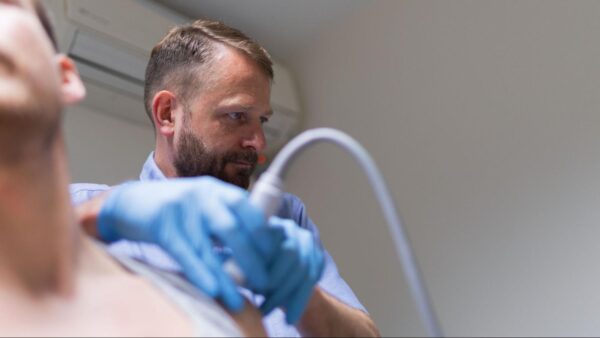In short, no. Steroid injections do not make you put on weight?. However, weight gain can be associated with long-term oral (tablet) steroid use. This is very different from a steroid injection and in this article we will highlight the differences.
There are many misconceptions regarding steroid injections, so it is essential that when patients are making a choice about their treatment, they are given accurate information. There are many myths out there, and a significant amount of inaccurate information on the internet.
What is the difference between steroid injections and oral (tablet) steroid use?
The steroid injections used in musculoskeletal healthcare are very localised injections aimed at reducing inflammation in specific tendons, bursae, and joints. Although the medication does eventually get absorbed and pass through the body to be excreted, its main action takes place at the specific tissue injected. At Complete, we use ultrasound guidance to carry out the injection, so we know exactly where drug is deposited.
Oral steroids, such as prednisolone, are used for many different medical conditions, such as rheumatoid arthritis, some skin conditions, cancer, and other auto-immune diseases. Because the drug is taken orally, commonly for systemic illness, and often for a long period of time, it continually passes through the body and so has a more global effect on many of the body’s processes. Its effect on some of these processes can lead to weigh gain.
What conditions are steroid injections used for?
Firstly, we need to consider the different types of steroid injection and the reasons for giving them. Steroid injections are used to treat a variety of ailments and illnesses.
At Complete we predominantly use steroid injections for tendon and joint complaints, for example when treating sports injuries, frozen shoulder, or bursitis. However, steroid injections can also be used to treat other medical conditions such as hay fever, and skin complaints.
The other type of steroid injections you may have heard of are anabolic steroids, often used by bodybuilders. Anabolic steroids are completely different to the steroid injections we carry out at Complete and have different negative side effects.
Do steroid injections make you put on weight?
At Complete, we inject cortisone into a joint or soft tissue, using ultrasound guidance, to reduce pain. This is a very targeted approach, using a low dose (10-40mg) of cortisone. Because it is a small dose injected directly into the structure that is causing pain, it does not pass through the body, minimising any negative side effects. It is also given as a single dose. One-off injections, or even multiple injections (for example, three injections in a year), do not cause weight gain.
After 2-4 weeks, we expect that a single dose of injected steroid will have been fully excreted from the body. The action of the injected steroids we use is between 8-14 days (Stephens et al., 2008).

Compare this with patients taking oral steroids (e.g., low dose prednisolone, 5-10 mg per day), for rheumatoid arthritis. In a research study over a two-year period, this usage caused patients to gain between 4-8% of their baseline body weight (Da Silva et al., 2006). So, when it comes to oral steroids, there is evidence to suggest that weight gain is a possible side effect. Long term and/or high dose use of oral steroids can affect your metabolism and how and where your body deposits fat.
Some bodybuilders use anabolic steroids which are synthetic variations of the male sex hormone, testosterone. These are very different to cortisone and should not be confused (NIDA, 2018). These types of steroids would potentially lead to muscular weight gain, as is the intended purpose. Anabolic steroids cause weight gain through increased muscle tissue production not through increased fat deposition.
What type of steroids do we use for a steroid injection?
For musculoskeletal steroid injections, we commonly use two types of steroids/cortisone:
- Methylprednisolone acetate (brand name – Depo-Medrol or Depomedrone)
- Triamcinolone acetonide (brand name – Kenalog)
The research does not support one type over the other. They are both relatively potent, long-lasting steroids which can provide rapid pain relief for many conditions. At Complete, these injections are used to reduce pain in conditions such as:
- Frozen shoulder
- Rotator cuff related shoulder pain
- Osteoarthritis of any joint
- Shoulder bursitis
Summary
In summary, injected corticosteroids used for treating pain and inflammation are not linked to weight gain. At Complete we only use steroid injections for musculoskeletal complaints and sports injuries such as tendinitis, arthritis, and bursitis.
If you have any questions relating to ultrasound guided steroid injections used for musculoskeletal problems, please contact one of our injection therapists via info@complete-physio.co.uk.
References:
Da Silva et al. (2006). Safety of low dose glucocorticoid treatment in rheumatoid arthritis: published evidence and prospective trial data. Ann of Rheum Dis. 65(3):285-93.


